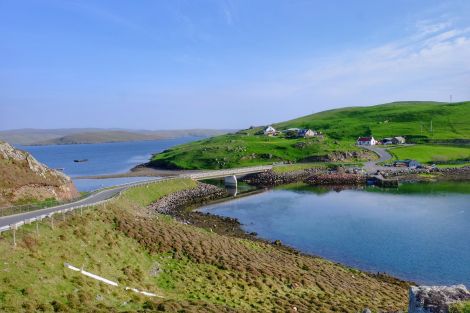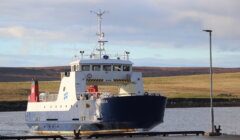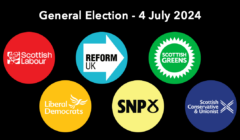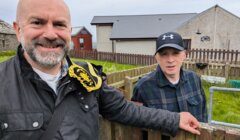Transport / Government pledges to assess ‘evidence base’ for fixed links
THE SCOTTISH Government says it will assess the “evidence base” for fixed links to islands and remote communities through its latest strategic transport review, which is due to be concluded by the end of the year.
The commitment is included in the government’s newly published Programme for Government, which sets out its plans for the year ahead and beyond.
Shetland Islands Council’s environment and transport committee chairman Ryan Thomson said in response that “anything which moves forward the prospect of fixed links for our islands has to be welcome news for islanders, and for businesses”.
Elsewhere there are a number of references to the islands including the creation of a centre of excellence for rural and remote medicine and social care and £30 million investment in an Islands Programme.
Among the headlines is the goal of holding an independence referendum by the end of 2023.
First minister Nicola Sturgeon said the government wants to hold a referendum when the Covid pandemic has passed.
But Scottish Conservative leader Douglas Ross said the first minister is putting “independence above Scottish jobs”.
Scottish Labour leader Anas Sarwar also criticised the ambition within the programme.
There is also mention of plans to form a new national care service, which has drawn concern locally.
The programme also contains increased funding in a range of areas, including in frontline and mental health services, education and dealing with the number of drug deaths in Scotland.
Some of the key pledges which potentially relate to Shetland are:
- Making sure communities are “well connected, investing in new and better public transport links and keeping ferry travel affordable for the islands”
- In rural and island communities, to aid recovery and assist businesses to set up, in the coming financial year the government will launch a £20 million Rural Entrepreneur Fund
- The government will invest £30 million over the next five years through the Islands Programme, to support delivery of the National Islands Plan and a fair, integrated, green and inclusive recovery.
- The government will deliver 110,000 energy efficient, affordable homes by 2032 – at least 70 per cent of which will be in the social rented sector and 10 per cent in the remote, rural and island communities
- A new Young Islanders Network will provide opportunities for young people in Scotland’s island communities to share their experiences, make their voices heard, shape decision‑making about issues that impact their lives and ensure that the National Islands Plan fully considers their interests and priorities
Become a member of Shetland News
The document also said it is “vital” that the island communities have the necessary connectivity – “linking them appropriately with the whole country, and ensuring they can access the same services and opportunities as their neighbours on the mainland”.
“Over the coming year, we will also prepare the Islands Connectivity Plan (ICP) to be published by the end of 2022, developing proposals to support delivery of the National Islands Plan,” it added. “We will assess the model of delivery of ferry services to deliver accountability, transparency and good outcomes for communities.”
The Scottish Government added that across the next two years “we will also provide £30 million of funding for the design and construction of replacement, or major maintenance, of lifeline local authority bridges”.
“And through the development of the Strategic Transport Review 2, to be concluded by the end of 2021, we will assess the evidence base for fixed links to islands and remote communities,” the programme noted.
“As recognised in Phase 1 of our second Strategic Transport Projects Review, one of the major barriers to public transport use has been connectivity, and a lack of convenient end‑to‑end travel options.
“We seek to align timetables where possible – however, establishing further transport integration across modes at key ferry terminals will benefit rural and island communities and visitors alike. To support integrated journeys at ferry terminals, we will identify locations and options for intervention, informing the Islands Connectivity Plan.”
North Isles councillor Thomson said in response that the “social and economical benefits of connecting our islands with sustainable alternatives to diesel guzzling ferries is clear and obvious”.
Fixed links such as tunnels for some of the Shetland’s islands are seen as the way forward for connectivity – but their cost means the council cannot do it alone.
“We’ve always said that fixed links are the future – we need to up the ante and make sure that fixed links are the primary consideration for the four islands within Shetland which are already identified,” Thomson said.
“I welcome this commitment from the Scottish Government. It appears that there is real traction nationally for fixed links and their benefits for Shetland and other island groups in Scotland, and Shetland must make sure it is well placed to contribute and lead on providing the necessary evidence for the benefit of fixed links for our islands, our communities and our businesses.”
Elsewhere in the programme the Scottish Government said it is clear that new oil and gas licences “should be assessed against a robust Climate Compatibility Check Point, and existing licences, pre-field development, should also be reassessed”.
It comes amid worry from climate campaigners over plans to extract oil from the Cambo field north west of Shetland.
The government also said its aim is to generate half of Scotland’s overall energy consumption from renewable sources by 2030, and by 2050 to have decarbonised the energy system almost completely.
Writing in the introduction to the report, Sturgeon said: “Over the last 18 months, the world, and our own individual places within it, have changed immeasurably.
“While the pandemic may have defined our lives for those dark and difficult months, the Scottish Government is determined that it does not define our future. This Programme for Government represents an important moment for Scotland to secure a brighter future.”
The publication is the first Programme for Government since the recent power-sharing deal between the SNP and the Scottish Greens.
The Greens said it will result in increased funding for home energy schemes and to tackle fuel poverty, as part of at least £1.8bn investment in net zero buildings.
Scottish Greens co-leader Patrick Harvie said: “This is a historic programme for government, the first with a Greens agenda anywhere in the UK.
“I’m proud we will lead efforts to lower the emissions produced by Scotland’s buildings, and the increased investment announced by the first minister will begin that work.”
The full document can be read here.
Become a member of Shetland News
Shetland News is asking its readers to consider paying for membership to get additional perks:
- Removal of third-party ads;
- Bookmark posts to read later;
- Exclusive curated weekly newsletter;
- Hide membership messages;
- Comments open for discussion.
If you appreciate what we do and feel strongly about impartial local journalism, then please become a member of Shetland News by either making a single payment, or setting up a monthly, quarterly or yearly subscription.













































































